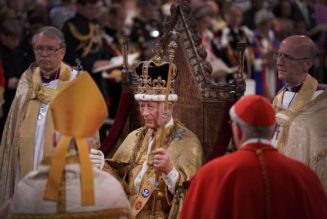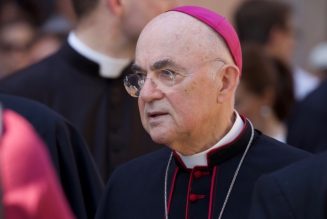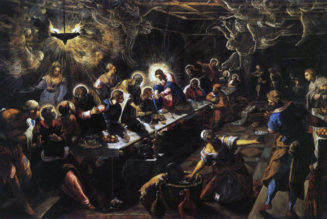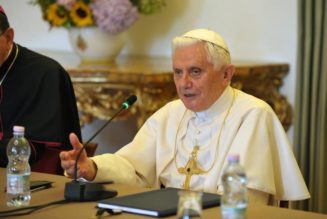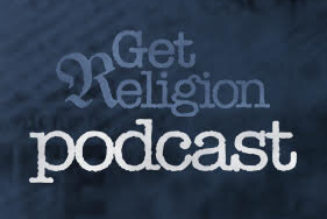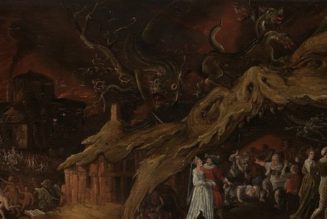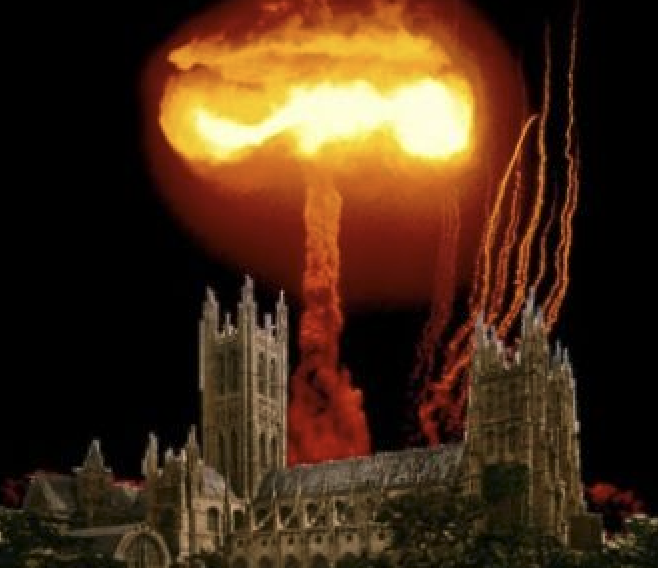
This week’s “Crossroads” podcast was recorded (live on radio and then edited) this past Wednesday afternoon and it is already a bit out of date (CLICK HERE to tune that in).
You see, this episode was intended as a kind of “walk-up” feature about press issues at the 15th Lambeth Conference of Anglican bishops from around the world (July 26-Aug. 8) in Canterbury. At that point, there wasn’t much coverage to critique, other than some reports the Guardian, as in: “Justin Welby forced to allow Anglican bishops to reject statement on sexuality.” Since then, Religion News Service has released this: “Same-sex marriage sparks divisive debate at twice-delayed Lambeth Conference.”
As you can see, the coverage — so far — has been shaped by a familiar template in which decades of Anglican warfare is reduced to a rather political fight over homosexuality, as opposed to church doctrines about biblical authority and sex outside of traditional marriage.
The twist in this old, old story is that most of the heroes in the press coverage are White progressives from rich First World nations and the villains are People of Color from the Global South (think Africa and Asia). Does that framework sound familiar to many news consumers? Hold that thought.
The podcast argued that sexuality is the popular news hook for the Anglican wars, but that the doctrinal issues at stake run much deeper. Thus, I would like to place the unfolding Lambeth 2022 drama in the context of what your GetReligionistas have long called “Anglican timeline disease.”
With that in mind, let’s flash back to 1992 — that’s three decades, for those keeping score. Here is the top of the 1999 “On Religion” column I wrote about this behind-the-scenes event: “The time for broken communion?” This is long, but essential:
It’s been seven years since Bishop C. FitzSimons Allison faced the fact that some of his fellow bishops worship a different god than he does.
The symbolic moment came during an Episcopal House of Bishops meeting in Kanuga, N.C., as members met in small groups to discuss graceful ways to settle their differences on the Bible, worship and sex. The question for the day was: “Why are we dysfunctional?”
“I said the answer was simple — apostasy,” said Allison, a dignified South Carolinian who has a doctorate in Anglican history from Oxford University. “Some of the other bishops looked at me and said, ‘What are you talking about?'”
Many Episcopalians, he explained at the time, have embraced the work of theologians such as Carter Heyward, a lesbian priest, seminary professor and author of books such as “Touching Our Strength: The Erotic as Power and the Love of God.” Allison asked the bishops how they would deal with those who say they serve a god that is “older and greater” than the God of the Bible.
Some of the bishops said they either shared this belief or could not condemn it.
When the time came to celebrate the Eucharist, Allison knew what he had to do in this particular circle of bishops. He declined to share the bread and the wine, but didn’t publicize his act of conscience.
This brings me to news from Lambeth that is only a few hours old and, thus, hasn’t broken into headlines produced by major newsrooms. The headline at the Episcopal News Service proclaims: “Conservative bishops to refuse to take Communion with LGBTQ+ bishops, demand ‘sanctions’ for churches that allow for same-sex marriage.”
While this is a report from the official, church-funded wire service, it’s contents are precisely what readers can expect to see from elite newsrooms (think New York Times) in the Acela Zone between Washington, D.C., and Boston. Again, this is long, but essential:
Leaders of a group of conservative Anglican bishops say they will refuse to take Communion while worshiping alongside partnered gay and lesbian bishops at the Lambeth Conference, and they plan to submit and force a vote July 31 on their own measure opposing same-sex marriage and the ordination of gay, partnered clergy.
The group, which calls itself the Global South Fellowship of Anglican Churches, counts 23 Anglican provinces as members and says it represents 75% of Anglicans around the world, particularly in Africa and Asia. “For too long, the Anglican Communion has been driven by the views of the West. In the Global South, we often feel that our voice is not listen to or respected,” South Sudan Archbishop Justin Badi, chairman of the Global South Fellowship, said in a news conference July 29.
Badi’s group is engineering a confrontation with The Episcopal Church and at least five other provinces that have pursued inclusive LGBTQ+ policies. The orthodox bishops want to “impose sanctions” against those provinces, without specifying the sanctions or citing the authority under which they would be enforced. Their strategy runs counter to efforts by Lambeth Conference planners, including its convener, Archbishop of Canterbury Justin Welby, to publicly downplay disagreements over human sexuality and reject perceptions that the typically once-a-decade Lambeth Conference is a legislative body with any authority over its member provinces. An estimated 650 bishops are meeting from July 26-Aug. 8 at the University of Kent.
“It is not a synod,” Welby said earlier July 29 at his own news conference. “It has no legal authority of any kind over any province under any circumstance whatsoever.”
It’s important to note that bishops from several of the Anglican Communion’s largest provinces — Nigeria, for example — are already boycotting this Lambeth Conference and are not in attendance. How many Anglicans worship in Nigeria? That’s a controversial question, with estimates ranging from 9 million to the 25 million enlisted in some evangelistic programs.
As events unfold, it will be important for reporters to watch for statements from the conservative Global Anglican Future Conference (GAFCON), as well as the Global South Fellowship of Anglican Churches. There are bishops and provinces that are active in both of these groups.
At the heart of the current controversy is Lambeth Resolution 1.10, which was approved in 1998 — with 526 votes in favor, contrasted with 70 opposed and 45 abstentions (click here for my “On Religion” column written while attending that gathering). In the years since then, progressive churches in the West have continued to decline — many would say implode — while membership totals in the Global South continue to rise. However, the rich churches still have a higher ratio of voting bishops than those in the Global South. This affects voting.
It’s crucial for reporters to actually read the text of Lambeth 1.10 to see the wider doctrinal context of these battles over moral theology. You can see the small-o “orthodox” take on this piece of the official press release from the Global South Fellowship. Let’s walk through that:
The bishops … want the Communion to impose sanctions on Provinces which ordain bishops in same-sex relations, and conduct same sex weddings — something which has led to schism in the Church. They have also revealed that at the two Conference’ Eucharists at Canterbury Cathedral, orthodox bishops will not receive Holy Communion alongside gay-partnered bishops, and those who endorse same-sex unions in the Church’s faith and order. They shall remain seated.
The key word is “led,” as in “has led to schism in the church.” That’s past tense.
Reading on:
Speaking at their opening Press Conference of the Lambeth Conference, leaders of the Global South Fellowship of Anglican Churches (GSFA) said they had taken the move after extensive requests to the Archbishop of Canterbury for a stand-alone resolution and, following the inserted reference to Lambeth 1.10 was withdrawn, on Tuesday, from the ‘Human Dignity ‘Call’. GSFA leaders claim that the Conference organisers have failed to recognise the foundations of ‘Lambeth 1.10’ which, they say, “is not just about sex and marriage, but fundamentally about the authority of the Bible which Anglicans believe to be central to faith and order”.
The GSFA will now table their Resolution and invite primates and their bishops to ‘sign up’. On Monday, senior GSFA representatives will seek to address the issue in the Plenary session on the Anglican Communion, making available the text of their resolution to all bishops, and providing secure means by which bishops can affirm their support. The GSFA is confident that leaders representing the majority of Anglicans across the globe will sign up. They will then present a signed copy by GSFA Primates, and others, to the Archbishop of Canterbury, inviting him to add his signature.
Thus, the potent symbol — the same one chosen in 1992 by Allison — of “broken communion” at the high altar.
From the point of view of Anglicans in the Global South, what is at the heart of this battle? The word “colonialism” is not being used, but it was certainly implied in this statement:
Archbishop Justin Badi, Chairman of the GSFA and Archbishop of South Sudan said: “We have taken this action as if we are to ’walk together’ as a Communion, it must be on the based on a shared commitment to Holy Scripture.
“To us in our provinces, this is not primarily about gay sexual practices and unions, but rather that Anglicans look first and foremost to be guided in their faith and order by Scripture, and not by the passing cultural waves of Western society. Sadly, some provinces are adapting the teaching of the Church to try to appear relevant, and to make discipleship easier as a way of reversing fast-declining church attendance. But as disciples, we are not told in Scripture to mould Jesus into ‘our’ image, but to be continually transformed by the Spirit into ‘His’ image.
“For too long the Anglican Communion has been driven by the views of the West. We often feel that our voice is not listened to, or respected.
Will this lead to a walkout of some kind — by progressives, traditionalists or both? Will the missing GAFCON bishops attempt to walk IN for the key vote?
It’s safe to say that blue-zip-code newsroom coverage will escalate this weekend.
Let me end with a reference to a major theme in the podcast: Does this framework of this 2022 Anglican drama sound familiar?
Well, yes it does.
It’s very similar to the divorce that is currently infolding in the United Methodist Church — where the shrinking churches of North America hold the institutional high ground yet they have been outvoted, in global conferences, by the growing churches of (wait for it) Africa and Asia. See this very recent post: “Why are United Methodists at war? Readers need to know that sexuality isn’t the only fault line.”
Meanwhile, in the Church of Rome, the Vatican is caught between doctrinal progressives in the shrinking churches of Europe (think German synodality), along with the complex church in America, and the growing, doctrinally conservative churches of (wait for it) Africa and Asia. See this report from America, a strong publication on the Jesuit left: “Same-sex blessings, women deacons, lay leadership: Which German synod proposals will Pope Francis veto?”
Once again, the big headlines are about sexuality. But there are powerful issues — the traditional Latin Mass is only one condensed symbol — looming in the background.
Here’s an idea: Someone needs to place a call to historian Philip Jenkins, author of the truly groundbreaking book “The Next Christendom: The Coming of Global Christianity.” For a quicker take, see his 2002 essay for the Atlantic — “The Next Christianity” — which preceded the book.
Ponder this from Jenkins:
If we look beyond the liberal West, we see that another Christian revolution, quite different from the one being called for in affluent American suburbs and upscale urban parishes, is already in progress. Worldwide, Christianity is actually moving toward supernaturalism and neo-orthodoxy, and in many ways toward the ancient worldview expressed in the New Testament: a vision of Jesus as the embodiment of divine power, who overcomes the evil forces that inflict calamity and sickness upon the human race. In the global South (the areas that we often think of primarily as the Third World) huge and growing Christian populations — currently 480 million in Latin America, 360 million in Africa, and 313 million in Asia, compared with 260 million in North America — now make up what the Catholic scholar Walbert Buhlmann has called the Third Church, a form of Christianity as distinct as Protestantism or Orthodoxy, and one that is likely to become dominant in the faith. The revolution taking place in Africa, Asia, and Latin America is far more sweeping in its implications than any current shifts in North American religion, whether Catholic or Protestant. There is increasing tension between what one might call a liberal Northern Reformation and the surging Southern religious revolution, which one might equate with the Counter-Reformation, the internal Catholic reforms that took place at the same time as the Reformation — although in references to the past and the present the term “Counter-Reformation” misleadingly implies a simple reaction instead of a social and spiritual explosion. No matter what the terminology, however, an enormous rift seems inevitable.
What does the modernized Gospel of the West sound like?
Here is the Episcopal Bishop of Los Angeles, the Rt. Rev. John Harvey Taylor, responding to early Canterbury events in a blog post with this headline: “Bait-and-switch Lambeth Conference.”
Lambeth doesn’t legislate or set policy. But that won’t matter to a global audience that is likely to read that a majority of Anglican bishops refused to affirm the dignity of every human being. It’s exactly the wrong message to a world in agony. It’s the opposite of the Christian values of healing and reconciliation. It divides, hurts, scapegoats, and denies. It tempts younger people to flee faith and serves no one but the gods of secularization, who are lying in wait for the whole world.
In the wake of the news, should it come, The Episcopal Church will again have to work hard to remind people that we don’t read the Bible literally, divorced from its historic rootedness — that slowly but surely, across generations, we have moved away from arguing that the word of God countenances slavery, misogyny, homophobia, and transphobia. Slowly but surely, we’ve by and large adopted the view that our God in Christ loves, affirms, and elects all those whom God has made, across all expressions of orientation and identification.
That’s all for now.
Stay tuned. And enjoy the podcast and, please, share it with others.
Join Our Telegram Group : Salvation & Prosperity


